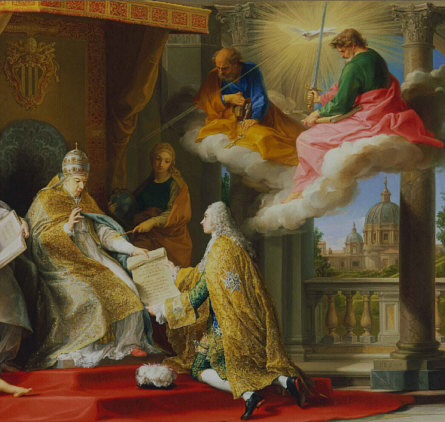~Freemasonry~ |

Papal Condemnations of Freemasonry

Pope Benedict XIV 1740-1758
Pope Benedict XIV 1740-1758
Pope Benedict XIV, on March 16, 1751 published the Constitution "Providas" in which he inserted in full In Eminenti, the Bull which had been written by his predecessor, Clement XII, in order to make it very evident that the condemnation of Freemasonry was irrevocable and was to be applied to the future as well as to the present.
As a matter of fact, Benedict XIV, had already denounced Masonry as being Counter-Morality in connection with the Order of Felicity of Avignon, a Secret Society of debauchers; among themselves the members of this Society spoke only in a kind of slangy language usually used by sailors. The Pope mentions it twice in his correspondence. I am here transcribing a few lines from his letter of March 25th, 1744, addressed to the Cardinal de Tencin, who was the Pontifical Ambassador at the Court of King Louis XV: "We have received from Avignon the news that in Nimes and also at Montpellier the Freemasons gave a great entertainment in order to gain proselytes. Women and men from the Avignon Society went to it, and, doubtless, upon their return they will organize a Freemasonic Lodge as they once had already attempted to do under the name of Society of Felicity; they might have succeeded had it not been for the zeal of the Archbishop. We wish you to protest, in Our name, to His most Christian Majesty. so that He Will not authorize in His States, the Sect of Freemasons which other Princes have extirpated from their own country." (From the correspondence of Pope Benedict XIV by Gmile de Heckeren. )
Furthermore, in his Constitution, "Providas," Benedict XIV enumerates six reasons which drove Pope Clement XII to strike Secret Societies; they are 1) the Interconfessonalism (or Interfaith) of Freemasons; 2) their secret; 3) their oath; 4) their opposition to Church and State; 5) the interdiction pronounced against them in several States by the Heads of such countries; and, 6) their immorality which the Pope characterizes thus: "Those Societies, according to men who are prudent and honest, are ill-famed, and to become a member thereof, would lead to evil and perversion."
From the outset, before the 18th century, under the efforts of Masonry which sank us into the horrors of the French Revolution, the Sect had been unmasked by the Popes and exposed before the eyes of the Catholics with its odious triple shame of Counter-Morality, Counter-State, and above all, Counter-Church. Let a Freemason, F. Limousin, in his first number of the Masonic Review called "L'ACACIA," of October, 1902, using the pen-name of Hiram, gives the following characteristic definition: "Freemasonry is an association . . . an institution . . . so it is said . . . but it is not that at all. Let us lift up all the veils, risking even to evoke numberless protestations. Freemasonry is a church: It is the Counter-Church, Counter-Catholicism: It is the other church -- the church of heresy, of Freethought; The Catholic Church is considered as the arch-type church, the first church, church of dogmatism and of orthodoxy."
 © StGemma.com Web Productions Inc. 2005-Present. All rights reserved. |
Appendix I
Overiew of V-2 Sect Antipopes
Appendix II
Gregory XVII "Siri" The Pope in Red
Appendix IV
Prayer to St. Michael
The Coming Great Catholic Monarch
St. John Bosco's Dream (Vision) of Hell
Michael Dimond:
a False Prophet
Antichrist
(Catholic Prophecy)